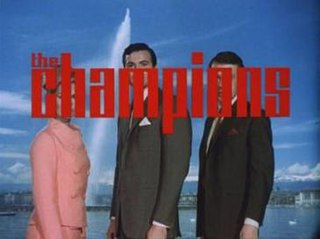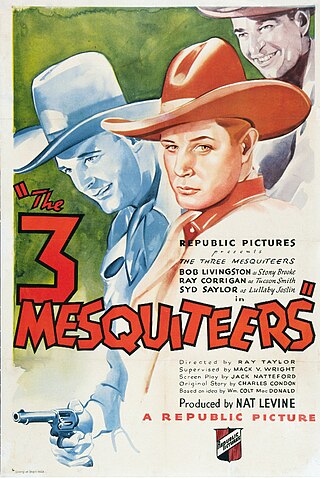Related Research Articles
The Saint is the nickname of the fictional character Simon Templar, featured in a series of novels and short stories by Leslie Charteris published between 1928 and 1963. After that date, other authors collaborated with Charteris on books until 1983; two additional works produced without Charteris's participation were published in 1997. The character has also been portrayed in motion pictures, radio dramas, comic strips, comic books and three television series.

The Wheel of Time is a series of high fantasy novels by American author Robert Jordan, with Brandon Sanderson as a co-author for the final three novels. Originally planned as a six-book series at its debut in 1990, The Wheel of Time came to span 14 volumes, in addition to a prequel novel and two companion books. Jordan died in 2007 while working on what was planned to be the final volume in the series. He prepared extensive notes which enabled fellow fantasy author Sanderson to complete the final book, which grew into three volumes: The Gathering Storm (2009), Towers of Midnight (2010), and A Memory of Light (2013).
A television film, alternatively known as a television movie, made-for-TV film/movie, telefilm, telemovie or TV film/movie, is a feature-length film that is produced and originally distributed by or to a television network, in contrast to theatrical films made for initial showing in movie theaters, and direct-to-video films made for initial release on home video formats. In certain cases, such films may also be referred to and shown as a miniseries, which typically indicates a film that has been divided into multiple parts or a series that contains a predetermined, limited number of episodes.
Science fiction is a film genre that uses speculative, fictional science-based depictions of phenomena that are not fully accepted by mainstream science, such as extraterrestrial lifeforms, spacecraft, robots, cyborgs, dinosaurs, mutants, interstellar travel, time travel, or other technologies. Science fiction films have often been used to focus on political or social issues, and to explore philosophical issues like the human condition.

Columbo is an American crime drama television series starring Peter Falk as Lieutenant Columbo, a homicide detective with the Los Angeles Police Department. After two pilot episodes in 1968 and 1971, the show originally aired on NBC from 1971 to 1978 as one of the rotating programs of The NBC Mystery Movie. Columbo then aired less frequently on ABC from 1989 to 2003.

The Walt Disney Company has produced an anthology television series since 1954 under several titles and formats. The program's current title, The Wonderful World of Disney, was used from 1969 to 1979 and again from 1991 onward. The program moved among the Big Three television networks in its first four decades, but has aired on ABC since 1997 and Disney+ since 2020.
The NBC Mystery Movie is an American television anthology series produced by Universal Pictures, that NBC broadcast from 1971 to 1977. Devoted to a rotating series of mystery episodes, it was sometimes split into two subsets broadcast on different nights of the week: The NBC Sunday Mystery Movie and The NBC Wednesday Mystery Movie.
A wheel series, wheel show, wheel format or umbrella series is a television series in which two or more regular programs are rotated in the same time slot. Sometimes the wheel series is given its own umbrella title and promoted as a single unit instead of promoting its separate components.

A crossover is the placement of two or more otherwise discrete fictional characters, settings, or universes into the context of a single story. They can arise from legal agreements between the relevant copyright holders, common corporate ownership or unofficial efforts by fans.

This is a list of notable Western films and TV series, ordered by year and decade of release. For a long-running TV series, the year is its first in production.

Turner Classic Movies (TCM) is an American movie-oriented pay-TV network owned by Warner Bros. Discovery. Launched in 1994, Turner Classic Movies is headquartered at Turner's Techwood broadcasting campus in the Midtown business district of Atlanta, Georgia.

The Champions is a British espionage thriller/science fiction/occult detective fiction adventure television series. It was produced by Lew Grade's ITC Entertainment production company, and consists of 30 episodes broadcast in the UK on ITV during 1968–1969. The series was broadcast in the US on NBC, starting in summer 1968.
The Bold Ones is the umbrella title for several television series. It was produced by Universal Television and broadcast on NBC from 1969 to 1973. It was a wheel format series, an NBC programming approach also used by that network in series such as The Name of the Game and the NBC Mystery Movie.

News broadcasting is the medium of broadcasting various news events and other information via television, radio, or the internet in the field of broadcast journalism. The content is usually either produced locally in a radio studio or television studio newsroom, or by a broadcast network. It may include material such as sports coverage, weather forecasts, traffic reports, political commentary, expert opinions, editorial content, and other material that the broadcaster feels is relevant to their audience. An individual news program is typically reported in a series of individual stories that are presented by one or more anchors. A frequent inclusion is live or recorded interviews by field reporters.

The ABC Movie of the Week was an American weekly television anthology series featuring made-for-TV movies that aired on the ABC network in various permutations from 1969 to 1975.

The Three Mesquiteers is the umbrella title for a Republic Pictures series of 51 American Western B-movies released between 1936 and 1943. The films, featuring a trio of Old West adventurers, was based on a series of Western novels by William Colt MacDonald. The eponymous trio, with occasional variations, were called Stony Brooke, Tucson Smith and Lullaby Joslin. John Wayne, who played Stony Brooke in eight of the films in 1938 and 1939, was the best-known actor in the series. Other leads included Bob Livingston, Ray "Crash" Corrigan, Max Terhune, Bob Steele, Rufe Davis and Tom Tyler.

Antenna TV is an American digital television network owned by Nexstar Media Group. The network's programming consists of classic television series, primarily sitcoms, from the 1950s to the 1990s. Antenna TV's programming and advertising operations are headquartered in the WGN-TV studios in Chicago. The network's operations are overseen by Sean Compton, who serves as the president of networks for Nexstar.

A film – also called a movie, motion picture, moving picture, picture, photoplay or (slang) flick – is a work of visual art that simulates experiences and otherwise communicates ideas, stories, perceptions, feelings, beauty, or atmosphere through the use of moving images. These images are generally accompanied by sound and, more rarely, other sensory stimulations. The word "cinema", short for cinematography, is often used to refer to filmmaking and the film industry, and the art form that is the result of it.
ABC Saturday Movie of the Week is the umbrella title of a weekly American film series that airs on ABC. The series began as the replacement for ABC's Big Picture Show and as a revival of ABC's Movie of the Week theme. Since its inception, it has been ABC's main platform for airing theatrical movies, although other movies air as part of the movie of the week format during the holiday season and as special presentations. Other presentations of Disney's animated films are placed under Wonderful World of Disney as an umbrella title.

Love Story is an American dramatic anthology television series focused on stories of romance. It aired from October 3, 1973, to January 2, 1974, on NBC.
References
- ↑ Description of Metadata Elements in the Yale Electric Library Archive (glossary)
- ↑ Glossary from American Society of Exercise Physiologists newsletter, July 1999
- ↑ Glossary from American Academy of Family Physicians
- ↑ Collective Bargaining Agreement between Board of Education Deerfield District #109 and Deerfield Education Association, IEA-NEA
- ↑ "Global Warming in the Supreme Court" - Sierra Club article mentioning umbrella groups (and an umbrella title) in lawsuit
- ↑ University of Massachusetts program for Danelo Pérez concert - includes history and terminology of jazz
- ↑ Tim Brooks and Earle Marsh, The Complete Directory to Prime Time Network and Cable TV Shows, 1946-Present (2003) ISBN 0-345-45542-8
- ↑ TV Guide Guide to TV 2006 (2006) ISBN 0-7607-7572-9